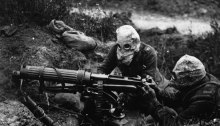I Didn’t Raise My Boy to be a Soldier: A Mother’s Plea for Peace
W.J. Astore The year was 1915. Europe, indeed much of the world, was embroiled in the devastating Great (or World) War. Under President Woodrow Wilson, the United States was proud to have stayed out of the war, the massive bloodletting of which seemed peculiarly European, an “Old World” form of militarized madness that most Americans…







